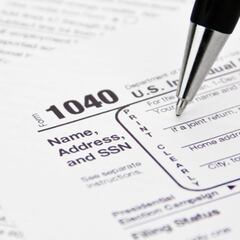IRS tax refunds on $10,200 in unemployment benefits: when are they coming?
The IRS has sent out almost 68 million refunds already this year. However if you received unemployment compensation you may have to wait for your refund.

The American Rescue Plan was enacted in March, after the 2021 tax season had already gotten underway. This gave the Internal Revenue Service (IRS) multiple new tasks to handle in addition to processing 2020 tax returns.
The sweeping $1.9 trillion covid-relief bill tasked the tax agency with sending eligible Americans $1,400 stimulus checks, implementing an enhanced Child Tax Credit that will send parents direct payments in July along with numerous other tax breaks. Those that received unemployment benefits during 2020 were given a tax break on up to $10,200 of jobless aid claimed over the year which the IRS will have to retroactively apply to 2020 tax returns already received.
-
What are the maximum unemployment benefits per state?
-
IRS confirms tax return backlog from 2019
-
A new proposal to revamp unemployment systems
-
Expected payment dates for child tax credit in the US
What do taxpayers need to do to claim the $10,200 waiver
For those who still haven’t filed their 2020 tax return, they can claim the waiver when they file. The IRS recommends filing electronically and using direct deposit to get your refund faster. If you make less than $72,000 a year you can use the IRS Free File.
However, the IRS had already sent out over 42 million refunds prior to the American Rescue Plan becoming law and over 66 million had sent the tax agency their 2020 tax return forms. This left people wondering what they had to do. The IRS has said that the agency will go back and retroactively apply the tax break on unemployment compensation received in 2020.
The federal government requires that states offer jobless aid recipients the option to have 10 percent of their weekly benefits withheld for federal taxes to avoid a surprise tax bill at the end of the year. However, with the federal pandemic unemployment programs established last year, some states didn’t offer the option. Roughly 40 million people received unemployment benefits in 2020, according to a Century Foundation report.
The Internal Revenue Service (IRS) has said in a statement that most taxpayers won’t have to do anything to get back money paid in taxes on unemployment compensation in 2020, they should receive and automatic refund starting in May. Although the tax agency hasn’t announced an exact start date, it will continue to process returns for taxpayers through the summer.
The IRS will do recalculations in two phases, starting with tax returns eligible for the up to $10,200 exclusion and then married couples filing jointly eligible for up to $20,400 along with more complex returns.
IRS2Go, the official #IRS mobile app, is available in both English and Spanish. Download it today as you #GetReady for filing season: https://t.co/ukWFEPY6PE pic.twitter.com/MXMQulzFbh
— IRSnews (@IRSnews) February 13, 2021
How can I check my refund?
The IRS offers a couple ways that you can check the status of your refund. You an use the agency's Where's My Refund? online tool or you can download the IRS2Go app to check your refund status.
Taxpayers will need to check with their state
The IRS recommends that taxpayers review their state tax return, as not all states have adopted the tax break on unemployment benefits. The IRS extended the federal filing deadline to 17 May this year to give taxpayers additional time to "help taxpayers navigate the unusual circumstances related to the pandemic." Taxpayers should check to see if their state tax agency extended the tax filing deadline to avoid any state level penalties.
How does the $10,200 tax break on unemployment benefits work?
#IRS will refund money this spring and summer to people who filed their tax return reporting unemployment compensation before the recent changes made by the American Rescue Plan. See: https://t.co/pglPeUWwVu pic.twitter.com/Bkr1lnKMo2
— IRSnews (@IRSnews) April 13, 2021
The tax waiver is only applicable to unemployment compensation received in 2020. It allows taxpayers to exclude up to $10,200 per person of unemployment benefits received. Both individuals and married couples filing jointly who have a modified adjusted gross income (AGI) of less than $150,0000 can claim the waiver.
However, married couples can only claim up to $10,200 per person, on income from unemployment compensation that each of them earned individually. If one received jobless aid for less than $10,200, the couple will not be able to claim the full $20,400 waiver.
Should I amend my return?
The IRS told taxpayers not to file an amended return unless the recalculation would make the taxpayer newly eligible for additional federal tax credits and/or deductions that hadn’t been included on the original tax return.
Related stories
Certain tax provisions can only be claimed based on a filers AGI along with other requirements. One tax credit in particular the IRS specifies is the Earned Income Tax Credit (EITC). Taxpayers who claimed the EITC will have their returns automatically adjusted, but the agency recommends filing an amended tax return for those who did not originally claim the EITC or other credits but now are eligible because the exclusion changed their income.
In all other cases the agency will determine the correct amount that needs to be taxed and issue a refund or use any overpayment toward outstanding debts.
- IRS
- Unemployment compensation
- Covid-19 economic crisis
- Science
- Unemployment
- Coronavirus Covid-19
- Economic crisis
- Inland Revenue
- United States
- Pandemic
- Coronavirus
- Recession
- Employment
- North America
- Economic climate
- Virology
- Outbreak
- Infectious diseases
- Public finances
- Microbiology
- Diseases
- America
- Medicine
- Work
- Economy
- Health
- Life sciences
- Biology


